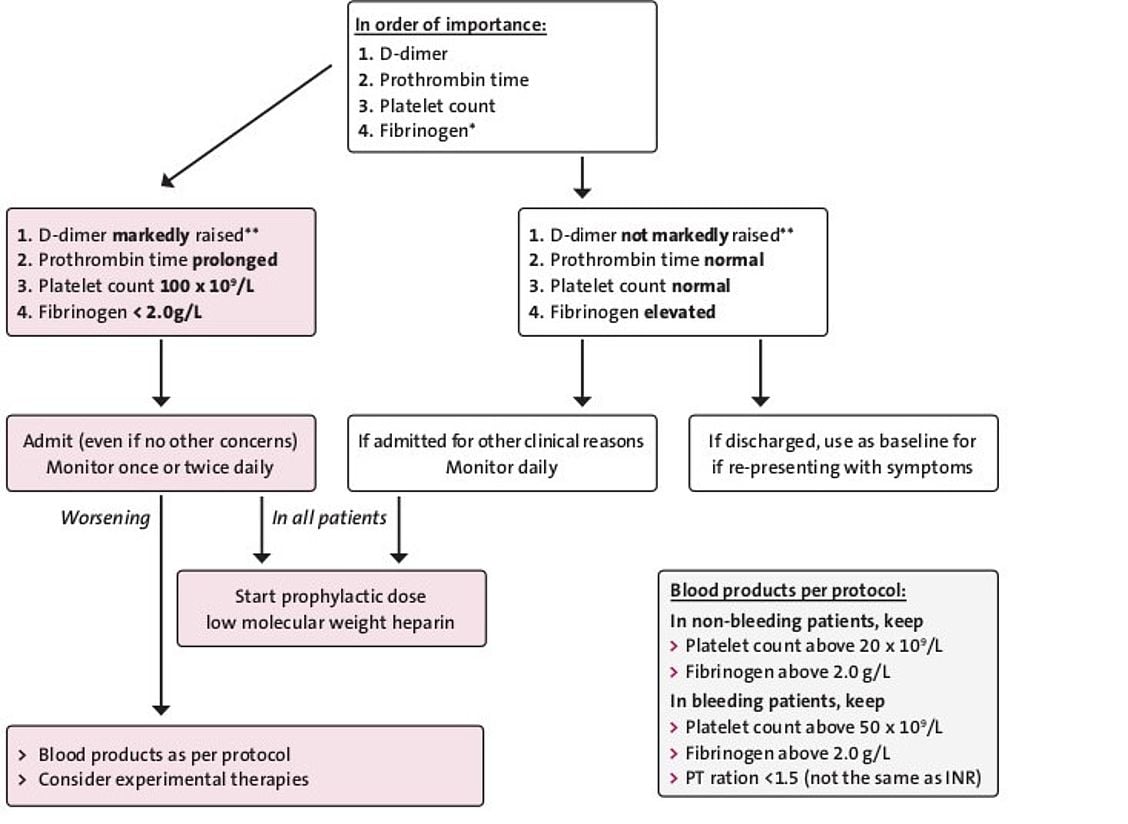- HUMAN Diagnostics Worldwide
- Lab Professionals
- Trends & Topics
ISTH (International Society of Thrombosis and Haemostasis) Interim guidance on recognition and management of coagulopathy in COVID-19
According to recent observations, coagulopathy often occurs in
severe cases
of COVID-19 patients.
Coagulopathy is a condition in which the ability of the blood to clot is impaired - a term that includes the thrombotic state in sepsis.2 The development of a coagulopathy is one of the most significant poor
prognostic features in COVID-19 patients. Therefore, the ISTH released a guidance document to provide support in managing COVID-19 patients
with coagulopathy based on an easy to use algorithm based on basic
laboratory parameters ; see diagram below.
ISTH algorithm for the management of coagulopathy in COVID-19 patients:
Modified flow chart: ISTH algorithm for the management of coagulopathy in COVID-19 patients based on simple markers1
* If feasible in the laboratory; can be helpful after patient admission
** Although a specific cut-off cannot be defined, a 3-4-fold increase in D-dimer values may be considered significant. Any one of the values in this table may be considered significant
Modified flow chart: ISTH algorithm for the management of coagulopathy in COVID-19 patients based on simple markers1
Why are D-dimer levels elevated in severe courses of COVID-19 patients?
D-dimer is a marker for increased coagulation processes in the body. Inflammatory processes and infections, like those with COVID-19, trigger the coagulation system by activated immune cells and a potential influence of cytokines. In severe cases this may lead to a condition in which small blood clots develop throughout the blood stream and block the small blood vessels. This high number of blood clots in the body is degraded by fibrinolysis. Fibrin degradation products (FDPs), like D-dimer, are the measurable result.3
Summary ISTH recommendation:
- Measurement of D-dimer, prothrombin time (PT) and platelet count in all patients suspected of having COVID-19 to decide on the prognosis of disease progression.
- In addition, it may be useful to measure serum fibrinogen, according to the ISTH guidance on disseminated intravascular coagulation (DIC).
- Prophylactic anticoagulation with low molecular weight heparin (LMWH) should be considered in ALL patients (including non-critically ill) who require hospital admission for COVID-19 infection.
References:
- ISTH interim guidance on recognition and management of coagulopathy in COVID-19. Thachil J, Tang N, Gando S, et al Journal of Thrombosis and Haemostasis 2020. doi: 10.1111/jth.14810
- Toshiaki I. et al. Advance in the Management of Sepsis-Induced Coagulopathy and Disseminated Intravascular Coagulation. J Clin Med. 2019 May; 8(5): 728. doi: 10.3390/jcm8050728
- Mukhopadhyay S, Johnson TA, Duru N, Buzza MS, Pawar NR, Sarkar R and Antalis TM (2019) Fibrinolysis and Inflammation in Venous Thrombus Resolution. Front. Immunol. 10:1348. doi: 10.3389/fimmu.2019.01348
Further HUMAN Products
HUMAN provides laboratories with integrated testing solutions for Hemostasis, offering Hemostat reagents and HumaClot analyzers, both semi-automated and fully automated to support the economic and accurate assessment of clotting or fibrinolytic parameters.




